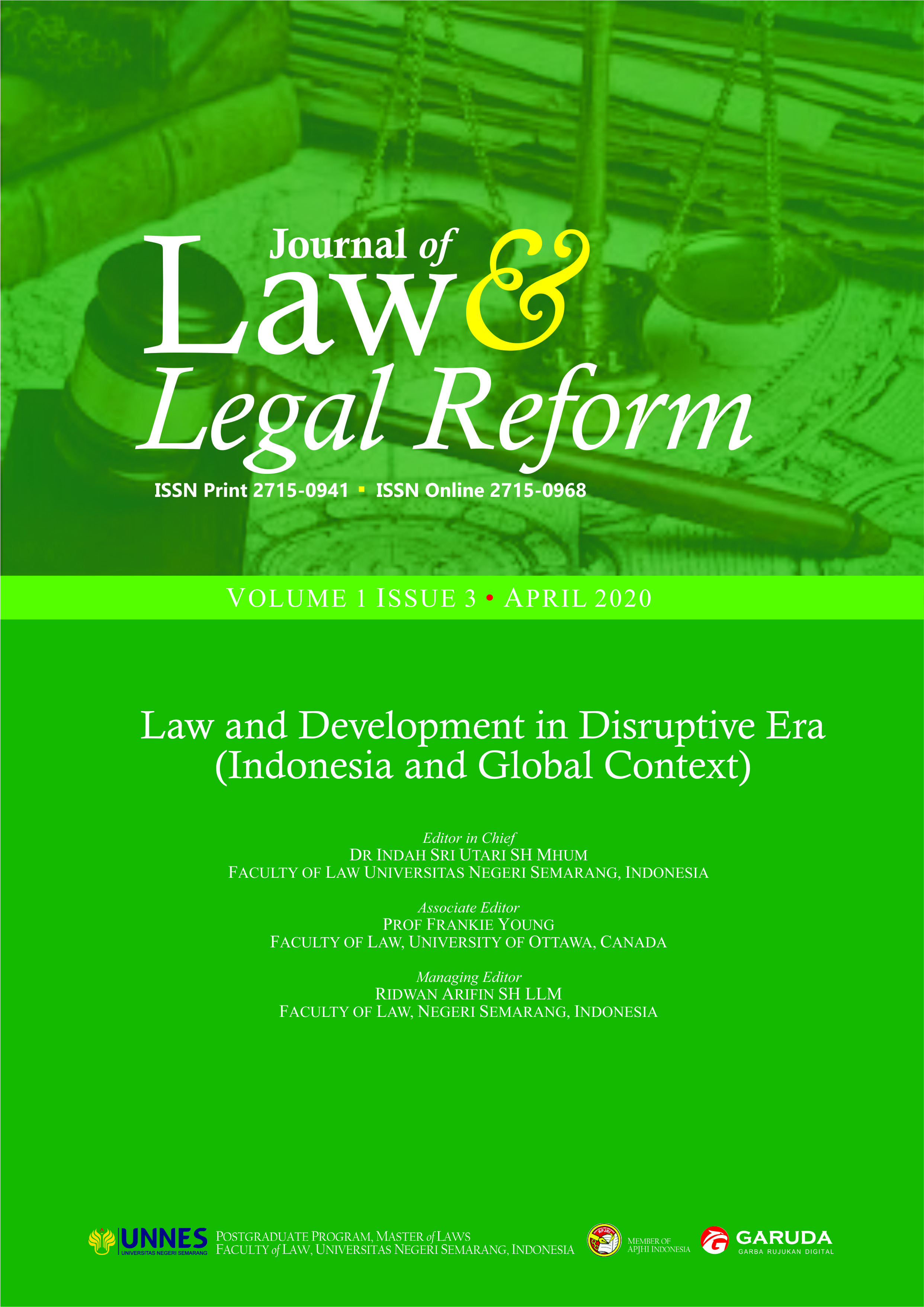Political Implications of Law in the Formation of Law No. 13 of 2003 concerning Workers Protection in Employment Agreement Specific Time (EAST/PWKT)
Main Article Content
Abstract
Basically social protection is a labor protection which aims to ensure that workers / laborers are valued for their dignity and status as human beings, not only as a factor of production (external factors, but are treated as humans with all their dignity and values ​​(internal or constitutive factors). Law in the Formation of Law No. 13 of 2003. This research study uses a research method with a normative juridical approach with data collection techniques in the form of library research.Political Politics in Lawmaking No. 13 of 2003 is influenced by the spirit of reform to better provide protection for workers / workers after the "dark era" in the new order, and because of the problems of era labor, it has to do with the economic problems in a country, especially in Indonesia, which is a developing country, which in the process of making this law is closely linked to economic politics.clear from the implications for PKWT workers. Where this is still a pros and cons. However, this is like a double-edged knife. In terms of politics clearly this can reduce unemployment but also the number of Workers / Workers who do not understand the protection they should get.
Article Details
All writings published in this journal are personal views of the authors and do not represent the views of this journal and the author's affiliated institutions. Author(s) retain copyrights under a Creative Commons Attribution-NonCommercial-ShareAlike 4.0 International (CC BY-NC-SA 4.0).
References
Arifin, W., & Arifin, R. (2019). Asas Keadilan Upah Guru Honorer dalam Perspektif Hukum (Principle of Justice for Honorary Teacher Wages in a Legal Perspective)’. Riau Law Journal 3(1), 85-104.
Arifin, R. (2020). Legal Services and Advocacy in the Industrial Revolution 4.0: Challenges and Problems in Indonesia. Indonesian Journal of Advocacy and Legal Services, 1(2), 159-162. https://doi.org/10.15294/ijals.v1i2.36488.
Arinanto, S. (2001). Politik Hukum 2. Jakarta: Program Pasca Sarjana FH UI.
Arinanto, S. (2001). Politik Hukum 3. Jakarta: Program Pasca Sarjana FH UI.
Asshiddiqie, J. (2002). Konsilidasi Naskah UUD 1945 Setelah Perubahan Keempat. Jakarta: PSHTN FHUI.
Chanddrawulan, A.A. (2011). Hukum Perusahaan Multinasional, Liberalisasi Hukum Perdagangan Internasional dan Hukum Penanaman Modal. Bandung: PT. Alumni.
Erawaty, E. (2015). Legal Aspects of Foreign Direct Investment in Indonesia: An Overview. Jakarta: ThaiFTA.
Friedmann, L.M. (1990). Teori dan Filsafat Hukum. Jakarta: Rajawali Press.
Graham, E.M., & Krugman, P. (1995). Foreign Direct Investment in The United States. Washington: Institute for International Economics.
Hartono, S. (1982). Hukum Ekonomi Pembangunan Indonesia. Bandung: Binacipta.
Hampton, M.R., & Abbott, J.P. (1999). Offshore Finance Centres and Tax Havens: The Rise of Global Capital. London: Mac Millan.
Hatta, M. (1977). Menuju Negara Hukum. Jakarta: Idayu Press.
Komar, M. (1999). Kumpulan Karya Tulis Menghormati 70 Tahun Prof. DR. Mochtar Kusumaatmadja, SH, LLM. Bandung: Alumni.
Lev, D.S. (1990). Hukum dan Politik di Indonesia: Kesinambungan dan Perubahan. Jakarta: LP3ES.
Mahasin, Z. Z., Naziah, F., & Arifin, R. (2020). Wage Problems in Indonesia in the Human Rights Perspective (Case of Inappropriate Wages for Pot Workers in Tangerang). The Indonesian Journal of International Clinical Legal Education, 2(1), 1-14. https://doi.org/10.15294/ijicle.v2i1.37326.
Mahfud MD, M. (2006). Politik Hukum di Indonesia. Jakarta: Rajawali Press.
Marbu, S.F. (2011). Peradilan Administrasi Negara dan Upaya Adninistratif di Indonesia. Yogyakarta: FH UII Press.
Mertokusumo, S. (2001). Penemuan Hukum Suatu Pengantar. Yogyakarta: Liberty.
Nasution, A. (2009). Penerapan Prinsip Transparansi dalam Undang-Undang Nomor 25 Tahun 2007 Tentang Penanaman Modal Kaitannya dengan Domestic Regulation WTO. Thesis, Univesitas Sumatera Utara.
Putri, A.R.H., & Arifin, R. (2019). ‘Perlindungan Hukum Bagi Korban Tindak Pidana Perdagangan Orang di Indonesia (Legal Protection for Victims of Human Trafficking Crimes in Indonesia)’. Res Judicata 2 (1), 170-185. DOI: http://dx.doi.org/10.29406/rj.v2i1.1340.
Rais, M.A. (2008). Agenda Mendesak Bangsa: Selamatkan Indonesia! Yogyakarta: PPSK Press.
Sihombing, J. (2008). Investasi Asing Melalui Surat Utang Negara di Pasar Modal. Bandung: PT. Alumni.
